Find Help
More Items From Ergsy search
-

Ovarian cancer - signs and symptoms to look out for
Relevance: 100%
-

Ovarian Cancer
Relevance: 84%
-

Raising awareness of ovarian cancer
Relevance: 76%
-

About Breast cancer - signs and symptoms | NHS
Relevance: 57%
-

Bowel cancer - Symptoms and signs to look out for
Relevance: 55%
-

What are the symptoms of testicular cancer?
Relevance: 45%
-
Leukaemia: What are the signs and symptoms? | NHS
Relevance: 44%
-

Prostate cancer symptoms - detecting them early
Relevance: 41%
-

Worried about signs that could be cancer? Contact your GP practice | NHS
Relevance: 41%
-

Learn about bowel cancer (British Sign Language version)
Relevance: 40%
-

Dyspraxia Symptoms & Signs
Relevance: 39%
-

Dyspraxia Symptoms & Signs
Relevance: 38%
-
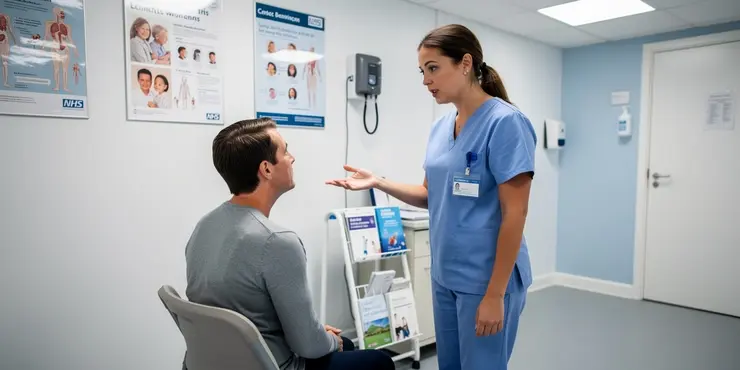
Get cancer symptoms checked by your GP | NHS - BSL version
Relevance: 36%
-
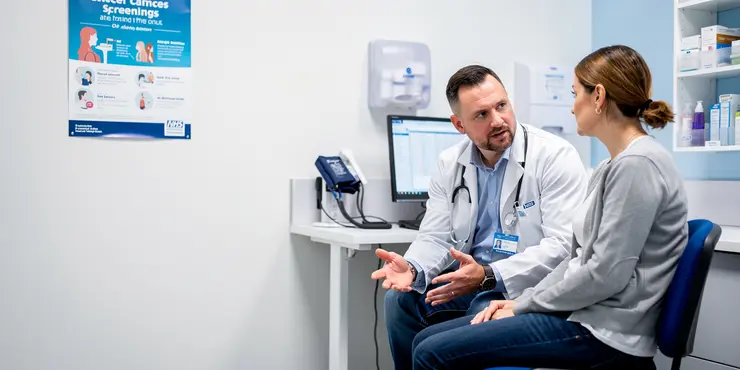
Get cancer symptoms checked by your GP | NHS
Relevance: 36%
-

What is a CA-125 test?
Relevance: 35%
-
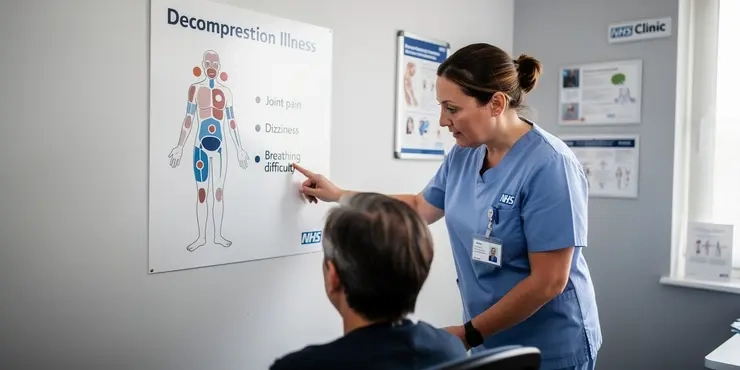
An Introduction to Decompression Illness: Signs & Symptoms”. Dr Roland Armes
Relevance: 33%
-

How often should I get screened for breast cancer?
Relevance: 32%
-

Vulval Cancer
Relevance: 32%
-
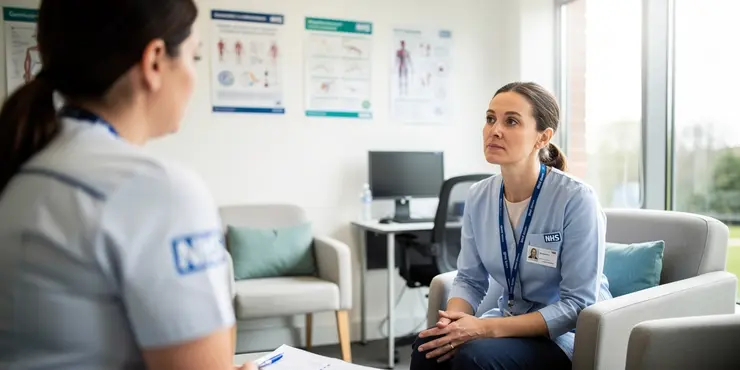
Is genetic screening available for cancer risk?
Relevance: 31%
-

Mouth Cancer Awareness
Relevance: 31%
-

Is testicular cancer treatable?
Relevance: 31%
-

What is testicular cancer?
Relevance: 30%
-

What kinds of cancer screening are available?
Relevance: 30%
-

Vaginal Cancer
Relevance: 30%
-

Type 2 diabetes - common signs and symptoms UHL NHS Trust
Relevance: 30%
-

Mouth Cancer Infomercial
Relevance: 30%
-
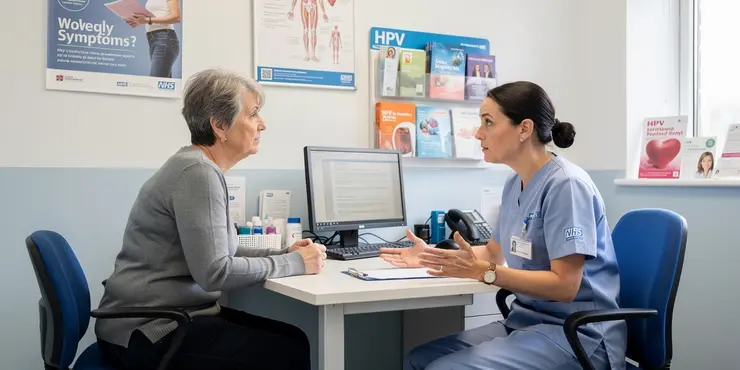
Are there symptoms of an HPV infection?
Relevance: 30%
-

Head and Neck Cancer Diagnosis
Relevance: 29%
-

Endometrial Cancer
Relevance: 29%
-

What are the signs of meningitis in infants?
Relevance: 29%
-

What is Cancer?
Relevance: 29%
-
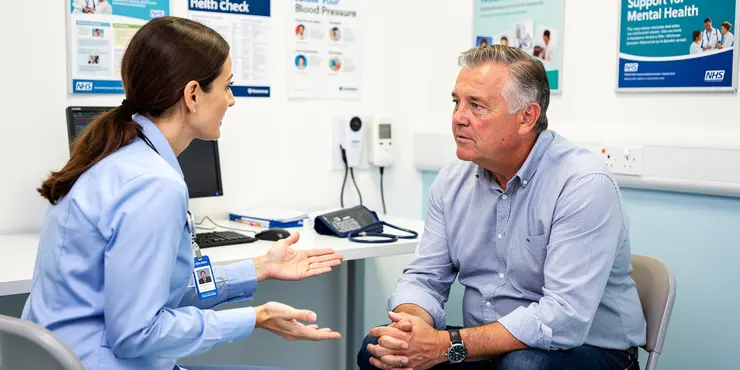
Living with prostate cancer
Relevance: 29%
-

What is a skin cancer screening?
Relevance: 29%
-

Endometrial Cancer
Relevance: 29%
-

What is Bowel Cancer?
Relevance: 28%
-

Endometrial Cancer
Relevance: 28%
-

How common is testicular cancer?
Relevance: 28%
-

Skin Cancer - How do I check if my mole is skin cancer? | NHS
Relevance: 28%
-

How is testicular cancer diagnosed?
Relevance: 28%
-

Can testicular cancer recur after treatment?
Relevance: 28%
Signs and symptoms of ovarian cancer
Ovarian cancer can be challenging to detect in its early stages because the symptoms can be subtle and easily mistaken for other conditions. However, it's important to be aware of the signs and symptoms, especially if they persist or worsen. Here are some common signs and symptoms of ovarian cancer:
- Abdominal or pelvic pain: Persistent discomfort or pain in the pelvic or abdominal area, often felt as a dull ache.
- Bloating: Feeling bloated or experiencing persistent swelling or a feeling of fullness in the abdomen.
- Difficulty eating or feeling full quickly: Changes in appetite or difficulty eating, along with feeling full quickly even when you haven't eaten much.
- Urinary symptoms: Frequent or urgent need to urinate, or difficulty emptying the bladder completely.
- Changes in bowel habits: Persistent changes in bowel habits, such as constipation or diarrhea, that are not due to other known causes.
- Unexplained weight loss or gain: Significant weight loss or gain without trying, especially if it's accompanied by other symptoms.
- Fatigue: Feeling unusually tired or fatigued, even after getting enough rest.
- Back pain: Pain in the lower back that doesn't go away, especially if it's not associated with a known injury or strain.
- Menstrual changes: Changes in menstrual cycles, such as irregular periods or abnormal bleeding.
- Pain during intercourse: Pain or discomfort during sexual intercourse, which may be a sign of ovarian cancer if it's persistent.
It's important to note that these symptoms can also be caused by other conditions, and having one or more of these symptoms does not necessarily mean you have ovarian cancer. However, if you experience any of these symptoms frequently or if they persist for more than a few weeks, it's essential to see a healthcare provider for evaluation and appropriate testing. Early detection and treatment of ovarian cancer can significantly improve outcomes.
Ovarian Cancer - Signs and Symptoms to Look Out For
Ovarian cancer, often referred to as the "silent killer," is a serious and potentially life-threatening condition. It is crucial to be aware of the signs and symptoms so that early detection and treatment can be sought. This guide aims to inform readers in the United Kingdom about the key indicators of ovarian cancer.
Common Early Symptoms
In the early stages, ovarian cancer symptoms can often be subtle and easily mistaken for other common conditions. Early symptoms may include:
- Persistent bloating
- Pelvic or abdominal pain
- Difficulty eating or feeling full quickly
- Increased frequency or urgency of urination
Other Warning Signs
As ovarian cancer progresses, additional symptoms may develop. These can include:
- Fatigue
- Indigestion
- Back pain
- Painful intercourse
- Changes in bowel habits, such as constipation
- Menstrual changes, even in post-menopausal women
When to See a Doctor
If you experience any of the symptoms mentioned, and they persist for more than a few weeks, it is essential to consult your GP. Early detection of ovarian cancer can significantly improve the chances of successful treatment. Do not ignore any signs, especially if they are unusual for you and ongoing.
Getting Support
Receiving a diagnosis of ovarian cancer can be overwhelming. The Ovarian Cancer Action and Target Ovarian Cancer offer support and resources for patients and families in the United Kingdom. These organizations provide vital information, support groups, and advice to help you navigate this challenging time.
Conclusion
Awareness of the signs and symptoms of ovarian cancer is crucial for early diagnosis and effective treatment. If you notice persistent changes in your health that align with the symptoms outlined above, seek medical advice promptly. Your vigilance can make a significant difference.
Signs of Ovarian Cancer
Ovarian cancer is hard to find early because the signs can be easy to confuse with other health problems. It's important to know what signs to look for, especially if they don't go away or get worse. Here are some signs to watch out for:
- Belly or Pelvic Pain: Ongoing pain or discomfort in the belly or pelvic area. It might feel like a dull ache.
- Bloating: Feeling puffy or having a full feeling in your belly all the time.
- Trouble Eating or Full Quickly: Not feeling like eating, or feeling full after just a little bit of food.
- Urinary Problems: Needing to pee a lot or quickly, or trouble emptying your bladder.
- Bowel Changes: Constipation or diarrhea that doesn't have a known cause and doesn't go away.
- Weight Changes: Losing or gaining weight without trying, especially with other symptoms.
- Tiredness: Feeling very tired even after sleeping well.
- Back Pain: Back pain that doesn't get better, especially if you haven't injured yourself.
- Period Changes: Irregular periods or strange bleeding.
- Pain During Sex: Pain when having sex that doesn't go away.
These signs could be caused by things other than ovarian cancer, and just having one doesn't mean you have cancer. But if these signs happen a lot or last longer than a few weeks, you should see a doctor. Catching ovarian cancer early makes treatment more effective.
Ovarian Cancer - Signs to Look Out For
Ovarian cancer is a very serious illness. It's important to know the signs so doctors can find and treat it early. This guide helps people in the UK know what to look for.
Common Early Signs
At first, symptoms may be small and easy to confuse with other problems. Early signs include:
- Feeling bloated often
- Pain in your belly or lower area (pelvis)
- Feeling full very quickly when eating
- Needing to urinate more often or urgently
Other Warning Signs
As the cancer grows, other signs might appear. These are:
- Feeling very tired
- Having indigestion
- Getting back pain
- Pain during sexual intercourse
- Changes in bowel habits like constipation
- Changes in periods, even for women who have stopped having them
When to See a Doctor
If you have any of these symptoms for more than a few weeks, see your doctor. Finding ovarian cancer early can help treatment work better. Don’t ignore signs that are new or don’t go away.
Getting Support
Finding out you have ovarian cancer can be very hard. Ovarian Cancer Action and Target Ovarian Cancer are here to help people in the UK. They offer information, support groups, and advice for patients and families.
Conclusion
Knowing the signs of ovarian cancer is important for finding it early and getting the right treatment. If you notice changes that don’t go away and match these signs, talk to a doctor. Paying attention to these signs can help you a lot.
Frequently Asked Questions
What are the common early symptoms of ovarian cancer?
Common early symptoms of ovarian cancer include bloating, pelvic or abdominal pain, feeling full quickly, and urinary symptoms like urgency or frequency.
How can I differentiate between normal abdominal issues and potential ovarian cancer symptoms?
If symptoms like bloating, pelvic pain, or changes in bowel habits persist for more than a few weeks or are unusual for you, it is important to see a GP.
Are there any silent symptoms of ovarian cancer?
Ovarian cancer is often referred to as a 'silent' disease because early symptoms are vague and can be easily mistaken for other common conditions.
Who is most at risk for developing ovarian cancer?
Risk factors include being over 50, having a family history of ovarian or breast cancer, genetic mutations (BRCA1 or BRCA2), endometriosis, and using hormone replacement therapy.
Can ovarian cancer cause menstrual changes?
While less common, changes in menstrual cycles can occur with ovarian cancer. Any significant changes should be discussed with a healthcare provider.
Is persistent fatigue a symptom of ovarian cancer?
Yes, persistent fatigue can be a symptom of ovarian cancer, especially if it is accompanied by other symptoms like bloating and pelvic pain.
Does ovarian cancer cause back pain?
Back pain can be a symptom of ovarian cancer, particularly if it is persistent and unexplained by other conditions.
What role does family history play in ovarian cancer risk?
A family history of ovarian, breast, or colorectal cancer can increase the risk, especially if immediate family members were diagnosed with these cancers at a young age.
Can gastrointestinal problems signal ovarian cancer?
Gastrointestinal symptoms like constipation, loss of appetite, or feeling full quickly can be associated with ovarian cancer and should be evaluated if persistent.
Are there screening tests available for ovarian cancer?
Currently, there is no routine screening test for ovarian cancer for women without symptoms or a high risk. Regular check-ups and discussing any symptoms with a GP are crucial.
What diagnostic tests are used to detect ovarian cancer?
Diagnostic tests can include pelvic exams, transvaginal ultrasound, CA-125 blood tests, and sometimes CT scans or biopsies.
Does weight gain or weight loss indicate ovarian cancer?
Unexplained weight loss or weight gain, particularly if it's rapid or with accompanying symptoms such as bloating and pelvic pain, should be checked by a GP.
Can changes in bowel habits be a symptom of ovarian cancer?
Yes, changes in bowel habits such as constipation, diarrhea, or frequent urges to urinate can be symptoms.
Is it common to experience pain during intercourse with ovarian cancer?
Pain during intercourse (dyspareunia) can be a symptom of ovarian cancer, though it is more commonly associated with other conditions.
How important is early detection in ovarian cancer?
Early detection of ovarian cancer significantly improves the chances of successful treatment. It's important to be vigilant about any persistent or unusual symptoms.
What are the early signs of ovarian cancer?
Ovarian cancer is a sickness in the ovaries. Here are some early signs:
- Tummy (belly) feels bloated.
- Tummy hurts.
- Feel full quickly when eating.
- Need to pee often.
If you have questions or are worried, talk to a doctor.
Ovarian cancer can have early signs. You might feel:
- Bloated, like your tummy is full of air.
- Pain in your tummy or lower down near your hips.
- Full after eating only a little bit.
- The need to pee a lot or urgently.
If you notice these signs, it's a good idea to see a doctor. Drawing pictures of where you feel pain can help explain to the doctor. You can also use a diary to track how often these things happen.
How can I tell if tummy problems are normal or signs of ovarian cancer?
If you have a tummy ache, it might be just a normal tummy trouble. But sometimes, it could be something more serious. Here is how you can tell the difference:
- Normal tummy problems: These often go away on their own. They might include gas, feeling full, or needing to go to the toilet.
- Worrying signs: If you have pain and it doesn't go away, or if you are bloated for a long time, talk to a doctor. Other signs to look for are losing weight without trying, or feeling very tired.
Ask a doctor if you are unsure. It's always better to be safe. Use tools like charts to write down how you feel each day. This can help you explain things to your doctor better.
If you have a tummy that feels full or achy, or if going to the toilet is different and these things last for a few weeks, you should see a doctor.
Are there any hidden signs of ovarian cancer?
Ovarian cancer can be hard to notice. Sometimes there are signs that are easy to miss. Here are some signs:
- Stomach pain or feeling full quickly
- Swelling in the tummy area
- Need to pee often
- Feeling tired all the time
If you notice these signs, talk to a doctor. They can help you feel better.
You can use pictures or videos to help understand more about ovarian cancer. Talking with someone you trust can also help.
Ovarian cancer is sometimes called a 'silent' disease. This is because the early signs are not clear and can be confused with other everyday problems.
If you find it hard to read or understand, you can try using pictures or videos to help explain things better. You can also ask someone you trust to help you read.
Who is most likely to get ovarian cancer?
Ovarian cancer is when bad cells grow in the ovaries. Ovaries are small organs inside a woman's body. These bad cells can make a person very sick.
Some people have a higher chance of getting ovarian cancer. Here are some reasons why:
- If someone in your family has had ovarian cancer.
- If you are older. This means the chance is higher as you age.
- If you have had other types of cancer before.
It helps to talk to a doctor if you think you might be at risk. A doctor can tell you more and help keep you healthy.
Using tools, like charts or pictures, might help you understand better. Having a friend or family member with you can also be helpful when talking about this with a doctor.
Things that might make the risk higher include being older than 50, having family members who had ovarian or breast cancer, having certain genes (called BRCA1 or BRCA2), having endometriosis (a health problem with the womb), and using hormone medicines.
If you find some words hard to understand, you can look them up using a dictionary or ask someone for help.
Can ovarian cancer change periods?
It's not very common, but ovarian cancer can change your periods. If your periods change a lot, you should talk to a doctor.
Can feeling tired all the time mean you have ovarian cancer?
Feeling very tired for a long time can be a sign of ovarian cancer. But being tired a lot can also happen for other reasons. If you feel tired for many days, talk to a doctor.
Here are some things that can help if you feel very tired:
- Make sure you get enough sleep every night.
- Eat healthy food to give you energy.
- Take breaks during the day to rest.
It is important to listen to what your body is telling you. Ask someone you trust to help you talk to a doctor if you are worried.
Feeling tired all the time can be a sign of ovarian cancer. This is true if you also have other signs like a swollen tummy or pain in your lower belly.
Can ovarian cancer make your back hurt?
Ovarian cancer might make some people have back pain. But not everyone with back pain has ovarian cancer. If your back hurts a lot, it is a good idea to see a doctor.
Here are some things you can do to help:
- Write down how you feel. This can help you remember when talking to a doctor.
- Ask someone you trust to go with you to the doctor. They can help remember what the doctor says.
- Use pictures or videos to learn more about back pain and ovarian cancer.
Back pain can sometimes mean you might have ovarian cancer. This is more likely if the back pain does not go away and doctors do not know what else is causing it.
How does family history affect the risk of getting ovarian cancer?
If someone in your close family, like a mom or sister, had cancer in the ovaries, breasts, or bowel, it can make your chances of getting it higher. It is even more important to know if they were young when they found out they had cancer.
Can tummy problems be a sign of ovarian cancer?
Sometimes, if your tummy feels bad, it could be a sign of a bigger problem.
If you have tummy aches, feel full quickly, or have a bloated tummy a lot, it might be important to tell an adult you trust or a doctor.
They can help check if everything is okay.
Remember to ask for help if you feel worried or in pain.
Sometimes, problems with your tummy can happen if you have ovarian cancer. These problems might include things like not being able to poop easily, not feeling hungry, or feeling full quickly after eating just a little bit. If these problems don't go away, you should talk to a doctor.
Can doctors check if someone might have ovarian cancer?
Right now, there is no regular test to check for ovarian cancer if you do not have symptoms or aren't at a high risk. It's important to have regular doctor visits and talk to your doctor if you notice any symptoms.
How do doctors find out if someone has ovarian cancer?
Doctors use different tests to find out what is wrong. These tests can be:
- A pelvic exam. This is when a special doctor checks the area around your tummy and private parts.
- A transvaginal ultrasound. This is a special picture of the inside of your tummy. It helps doctors see things better.
- A CA-125 blood test. This is when doctors take a little bit of your blood to check for signs of sickness.
- Sometimes, a CT scan. This is a big camera that takes pictures of the inside of your body.
- Sometimes, a biopsy. This is when doctors take a tiny piece of something from your body to look at it closely.
If you find it hard to read, you can ask someone to read it to you. You can also try using a computer or phone app that reads out loud.
Can gaining or losing weight mean you have ovarian cancer?
Sometimes, people gain or lose weight quickly. This can happen for many reasons.
It is important to know that gaining weight or losing weight does not always mean you have ovarian cancer.
If you are worried about your weight changes, it is a good idea to talk to a doctor.
They can help figure out what is going on. Talking to someone can make you feel better.
Using pictures, videos, or talking to someone can help you understand more.
If you lose or gain weight and don't know why, you should talk to your doctor. This is extra important if it happens fast or if you also have a swollen belly or tummy ache.
Can changes in bathroom habits mean ovarian cancer?
If you notice changes in how you go to the bathroom, it might be important. Sometimes, it can be a sign of ovarian cancer. Ovarian cancer is a kind of illness in women. It affects the ovaries. If your bathroom habits change a lot and do not get better, tell a doctor.
Here are some tools and tips to help:
- Ask someone you trust to go with you to the doctor.
- Use a diary to write down changes in your bathroom habits.
- Use simple words when telling the doctor how you feel.
Yes, changes in how you go to the bathroom can be signs of a problem. This includes being constipated, having diarrhea, or needing to pee a lot.
Do people with ovarian cancer often feel pain when having sex?
If you have ovarian cancer, you might feel pain when having sex. This can happen to many people.
If you have this pain, talk to a doctor. They can help you feel better.
You can also use pillows for support or try different ways to be close with your partner.
Pain during sex can sometimes be a sign of ovarian cancer. But it is often caused by other things.
Why is it important to find ovarian cancer early?
Finding ovarian cancer early is very important. If we find it early, doctors can start treatment sooner. This can help people feel better and live longer.
If you have questions or need help, ask a doctor or nurse. They can explain things in a way you understand. You can also use picture cards or videos to help you learn.
Finding ovarian cancer early makes it much easier to treat. It's important to watch out for any changes in your body that last a long time or feel different from normal.
Useful Links
This website offers general information and is not a substitute for professional advice.
Always seek guidance from qualified professionals.
If you have any medical concerns or need urgent help, contact a healthcare professional or emergency services immediately.
Some of this content was generated with AI assistance. We’ve done our best to keep it accurate, helpful, and human-friendly.
- Ergsy carfully checks the information in the videos we provide here.
- Videos shown by Youtube after a video has completed, have NOT been reviewed by ERGSY.
- To view, click the arrow in centre of video.
- Most of the videos you find here will have subtitles and/or closed captions available.
- You may need to turn these on, and choose your preferred language.
- Go to the video you'd like to watch.
- If closed captions (CC) are available, settings will be visible on the bottom right of the video player.
- To turn on Captions, click settings .
- To turn off Captions, click settings again.
More Items From Ergsy search
-

Ovarian cancer - signs and symptoms to look out for
Relevance: 100%
-

Ovarian Cancer
Relevance: 84%
-

Raising awareness of ovarian cancer
Relevance: 76%
-

About Breast cancer - signs and symptoms | NHS
Relevance: 57%
-

Bowel cancer - Symptoms and signs to look out for
Relevance: 55%
-

What are the symptoms of testicular cancer?
Relevance: 45%
-
Leukaemia: What are the signs and symptoms? | NHS
Relevance: 44%
-

Prostate cancer symptoms - detecting them early
Relevance: 41%
-

Worried about signs that could be cancer? Contact your GP practice | NHS
Relevance: 41%
-

Learn about bowel cancer (British Sign Language version)
Relevance: 40%
-

Dyspraxia Symptoms & Signs
Relevance: 39%
-

Dyspraxia Symptoms & Signs
Relevance: 38%
-

Get cancer symptoms checked by your GP | NHS - BSL version
Relevance: 36%
-

Get cancer symptoms checked by your GP | NHS
Relevance: 36%
-

What is a CA-125 test?
Relevance: 35%
-

An Introduction to Decompression Illness: Signs & Symptoms”. Dr Roland Armes
Relevance: 33%
-

How often should I get screened for breast cancer?
Relevance: 32%
-

Vulval Cancer
Relevance: 32%
-

Is genetic screening available for cancer risk?
Relevance: 31%
-

Mouth Cancer Awareness
Relevance: 31%
-

Is testicular cancer treatable?
Relevance: 31%
-

What is testicular cancer?
Relevance: 30%
-

What kinds of cancer screening are available?
Relevance: 30%
-

Vaginal Cancer
Relevance: 30%
-

Type 2 diabetes - common signs and symptoms UHL NHS Trust
Relevance: 30%
-

Mouth Cancer Infomercial
Relevance: 30%
-

Are there symptoms of an HPV infection?
Relevance: 30%
-

Head and Neck Cancer Diagnosis
Relevance: 29%
-

Endometrial Cancer
Relevance: 29%
-

What are the signs of meningitis in infants?
Relevance: 29%
-

What is Cancer?
Relevance: 29%
-

Living with prostate cancer
Relevance: 29%
-

What is a skin cancer screening?
Relevance: 29%
-

Endometrial Cancer
Relevance: 29%
-

What is Bowel Cancer?
Relevance: 28%
-

Endometrial Cancer
Relevance: 28%
-

How common is testicular cancer?
Relevance: 28%
-

Skin Cancer - How do I check if my mole is skin cancer? | NHS
Relevance: 28%
-

How is testicular cancer diagnosed?
Relevance: 28%
-

Can testicular cancer recur after treatment?
Relevance: 28%


